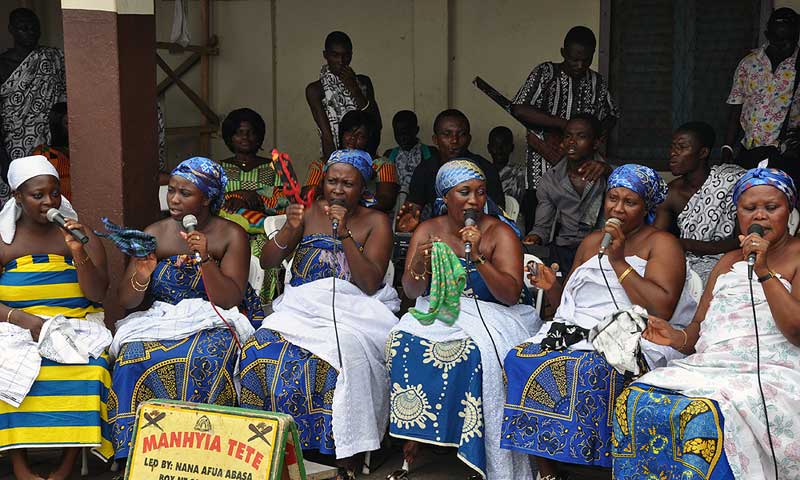Known for its strong religious beliefs, the nation Ghana with its diverse tribes numbering over 20, has special festivals purposely celebrated for religious significance. Here are two of the most popular religious festivals celebrated in Ghana.
The Akwasidae Festival, is celebrated by the Ashanti people and chiefs in Ashanti, as well as the Ashanti diaspora. The festival is celebrated on a Sunday, once every six weeks.
The Akan annual calendar is divided into nine months which lasts approximately six weeks but varying between 40 and 42 days in a period; the celebration of this period is called the Adae Festival. The Adae Festival has two celebration days: the Akwasidae Festival which is celebrated on the final Sunday of the period, while the Awukudae Festival is celebrated on a Wednesday within the period. The Friday preceding 10 days to the Akwasidae is called the Fofie (meaning a ritual Friday).
The rites on this day relate to honouring personal and community ancestors. A gathering called Akom occurs in which drumming, dancing and singing are a normal celebration to honour Abosom (lesser gods in the Akan tradition) and Nsamanfo (spiritually cultivated ancestors). Food offerings include special items such as eto (mashed African yam), garnished with hard-boiled eggs. Every Ashanti celebrates this festival. For those Ashantis who do not observe the festival of Odwira, the Akwasidae is very important to commemorate their ancestors.
On this day, the Asantehene (King of Ashante) meets his subjects and subordinate chiefs in the courtyard of the Manhyia Palace. The Golden Stool (throne) is displayed at the palace grounds in the presence of the king, and people visit in large numbers, singing and dancing.
The king holds his durbar on the occasion of the festival, and people have the liberty to shake hands with him. Before holding the durbar, the king goes in a procession in a palanquin decorated with gold jewelry. He also witnesses a colourful parade, from his palace grounds at Kumasi.
Easter, also called Pascha (Aramaic, Greek, Latin) or Resurrection Sunday, is a festival and holiday commemorating the resurrection of Jesus from the dead, described in the New Testament as having occurred on the third day after his burial following his crucifixion by the Romans at Calvary c. 30 AD.
Most Christians refer to the week before Easter as “Holy Week”, which contains the days of the Easter Triduum, including Thursday, commemorating the Last Supper, as well as Good Friday, commemorating the crucifixion and death of Jesus. In Western Christianity, Eastertide, or the Easter Season, begins on Easter Sunday and lasts seven weeks, ending with the coming of the 50th day, Pentecost Sunday. In Eastern Christianity, the season of Pascha begins on Pascha and ends with the coming of the 40th day, the Feast of the Ascension.
Easter and the holidays that are related to it are moveable feasts that do not fall on a fixed date in the Gregorian or Julian calendars which follow only the cycle of the Sun; rather, its date is offset from the date of Passover and is therefore calculated based on a lunisolar calendar similar to the Hebrew calendar.
The First Council of Nicaea (325) established two rules, independence of the Jewish calendar and worldwide uniformity, which were the only rules for Easter explicitly laid down by the council. No details for the computation were specified; these were worked out in practice, a process that took centuries and generated a number of controversies. It has come to be the first Sunday after the ecclesiastical full moon that occurs on or soonest after 21 March.
Easter is linked to the Jewish Passover (Hebrew: פֶּסַח pesach, Aramaic: פָּסחָא pascha) by much of its symbolism, as well as by its position in the calendar. In most European languages the feast is called by the words for Passover in those languages; and in the older English versions of the Bible the term Easter was the term used to translate Passover.[14] Easter customs vary across the Christian world, and include sunrise services, exclaiming the Paschal greeting, clipping the church, and decorating Easter eggs (symbols of the empty tomb).
The Easter lily, a symbol of the resurrection, traditionally decorates the chancel area of churches on this day and for the rest of Eastertide. Additional customs that have become associated with Easter and are observed by both Christians and some non-Christians include egg hunting, the Easter Bunny, and Easter parades. There are also various traditional Easter foods that vary regionally.
Though this festivity is associated with the Christian religion, it has become the celebration of the the tribe, Kwahu in the Eastern parts of Ghana. With people around the world and Ghana trooping to the Eastern Region, hooting the words, ‘Kwahu o Kwahu!!. This had brought a great deal of economic growth for the region and the country as a whole.
Activities include paragliding, hiking, carnivals and street jams. For the indigenes, that is the Kwahu people, it is an annual homecoming, but for holiday revelers it is an occasion for celebrations.
In 2005 the Ministry of Tourism began a paragliding activity as part of the line up events for the Easter celebrations. Kwahu Easter is a place of interest where tourist visit, typically for its inherent or exhibited cultural value, historical significance, natural or built beauty, or amusement opportunities.


